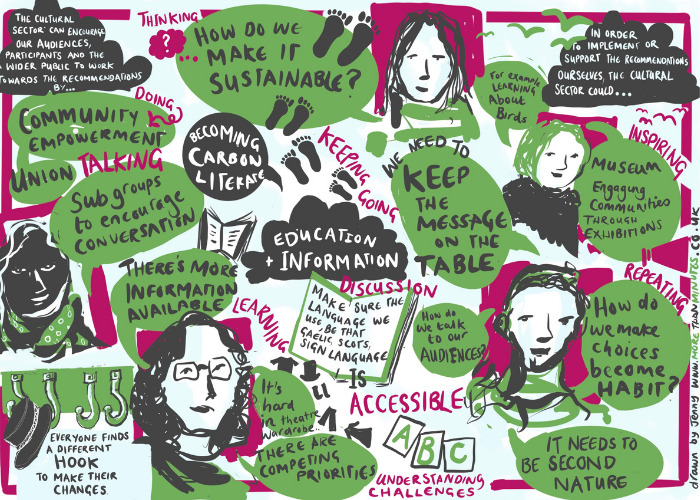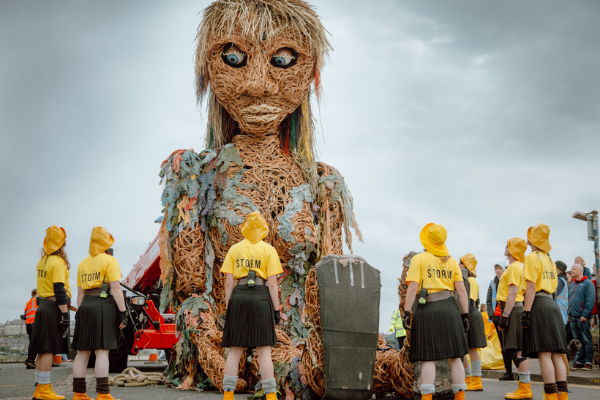How the arts can help us tackle the climate crisis
Art and creativity have a vital role to play in helping to address the climate emergency and contributing to a more environmentally sustainable Scotland.
Across the creative sector there is a huge amount of work being undertaken to deliver work in a more sustainable way, as well as to influence wider social transformation, using art and creativity to inform, inspire action, encourage changes in behaviour, and to improve participation in climate change debate and policy.
Creative Carbon Scotland
A big influence on this has been the work of Creative Carbon Scotland who have supported the creative sector in Scotland, not just in carbon management and reporting, but also through programmes like the Green Arts Initiative, culture/SHIFT and Climate Beacons for COP26.
Recently, Creative Carbon Scotland convened a working group, Culture for Climate Scotland, which has agreed on 10 steps for the cultural sector to adopt to reach net-zero emissions before 2045.
Artists and cultural organisations responding to climate change
Organisations and artists in all disciplines are already tackling climate change and developing understanding of the challenges with their audiences. In many cases their approaches and projects are pioneering.
Edinburgh Festivals have agreed a shared Carbon Reduction Route Map, which will enable the festivals to make their contribution to the city’s goal of reducing carbon emissions to net zero by 2030. The Scottish Classical Sustainability Group was co-founded in summer 2020 by Nevis Ensemble and Scottish Ensemble. The group’s work to date has seen it win the Environmental Sustainability Award at the Scottish Awards for New Music 2021.
Made from recycled materials, STORM is an awe-inspiring, 10-metre tall puppet created by Edinburgh-based visual theatre company, Vision Mechanics. She is inspired by the rich heritage and diverse culture of Scotland’s coasts and waters, but also carries a warning about the need to heal our planet by taking care of and celebrating the natural wonders and wildlife of the oceans.
Scotland’s largest puppet is touring across Scotland’s coastal, rural and urban communities this autumn.
Image: Storm is revealed Credit: Neil Hanna
Image: Storm at North Berwick, Credit: Martin McCarthy
"Arts projects such as Storm, as well as raising awareness of global environmental issues, also highlight local concerns. The projects bring people together, celebrating the importance of communities and their potential to effect change."
— Symon Macintyre, Artistic Director of Vision Mechanics
Let it Grow
Musicians from across Scotland including multi-award-winning folk musician and theatre maker Karine Polwart are creating a ‘tidal wave’ of music in response to COP 26 and the climate emergency as part of Let it Grow.
Image: Cop26 Core Band Credit: Heather Longwell
Alongside inviting musicians and performers of all kinds to take part, the project aims to amplify the voices of regular people from all walks of life, sharing their lived experience of the inequitable systems which fuel climate change, biodiversity loss, weather-related disasters and rising inequality.
If the idea resonates with you - grab an instrument and add your voice to the movement.
Ocean ARTic
Composer Michael Begg and environmental artist Eve Mosher are partnering with marine scientists to explore climate change data relating to changes in the Arctic and the consequences there and closer to home.
Michael is collaborating with scientists to bring together an ‘ensemble’ of data sets to sonify an aural experience of the impact of glacier ice melt in the Arctic. Eve is exploring the stories of climate scientists and coastal communities most intimately connected to the issue, weaving their lived experience with the research and data.
Eve said: "Art can create a personal, even emotional connection to the data. Sharing people's lived experience of climate change creates a level of understanding which motivates shifts in attitudes and actions in response to the challenges the world faces".
1.5 Degrees Films
Climate Challenge: 1.5 Degrees Films invites people to make 90-second short films in response to climate change, to be screened in and around this November’s UN Climate Change Conference.
Films must be short, only 1.5 minutes long – like the hoped-for maximum limit on global warming of 1.5 degrees – and can be made using any technology, including smartphones and tablet.
1.5 degrees refers to The Paris Agreement, the goal of which is to limit global warming to well below 2, preferably to 1.5 degrees Celsius, compared to pre-industrial levels. The early deadline for film submissions is midnight on 24th October 2021.
Find out more and get involved on the Film Access Scotland website
To learn about more artists responding to climate change, please visit Creative Carbon Scotland's website or Culture at COP, which details all COP26- related art, culture and heritage events (in-person and virtual). Creative Carbon Scotland have also created a handy Guide to Making Plans for COP26.
Climate Beacons for COP26
The COP26 climate talks coming to Glasgow in November are a major opportunity for the creative sector to step up its involvement in climate action. Spaces like theatres, galleries, arts centres, and museums can provide welcoming spaces for conversations and activities that develop our collective understanding and ability to act.
Bringing together shared resources and knowledge from cultural and climate organisations, more than 30 environmental, cultural and heritage organisations from across Scotland are coming together to form Climate Beacons that aim to inspire public engagement and positive action.
Building on Dundee’s design heritage, the Tayside Climate Beacon - a partnership between Dundee Rep and Scottish Dance Theatre, the James Hutton Institute, V&A Dundee, Dundee Museum of Transport and other partners in Dundee, Perthshire, Angus and Aberdeen - will use design-led-thinking as their central methodology and as a way of unlocking new or changed ways of doing things in order to create together our carbon neutral future.
Find out more on the Climate Beacons website, on Twitter @CCScotland and #ClimateBeacons.
“Humanity needs to engage emotionally and empathetically with the climate crisis, in order for lasting change, and therefore there is a leading role for creative expression in achieving this. Artists are empathy builders, makers of meaning and translators of information.
They can create ways of seeing and feeling that were often not there previously. They give visibility to new or different ways of looking and hearing. If we are to tackle the climate crisis, we will need to see, hear and feel differently. Artists and creatives supporting us with that feels vital.”
— Liam Sinclair, Executive Director & Joint CEO of Dundee Rep and Scottish Dance Theatre Limited




